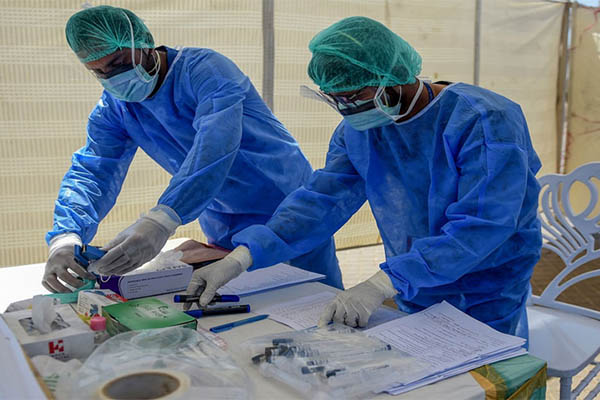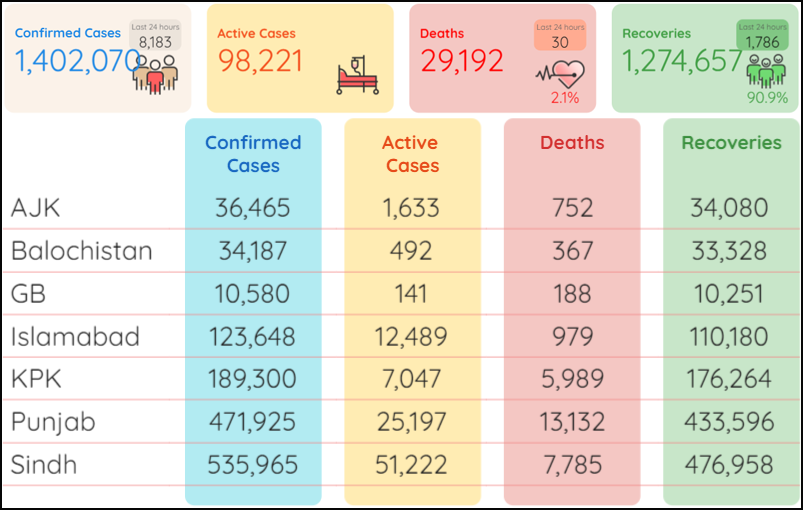
Courtesy PID
Confirmed infections of COVID-19 reach 1,402,070, against 1,274,657 recoveries and 29,192 deaths, leaving 98,221 active cases
Pakistan on Friday reported 8,183 new infections of COVID-19 after conducting 68,624 tests—a positivity ratio of 11.9 percent.
The National Command and Operation Center (NCOC) on Thursday reported that six cities across Pakistan had recorded COVID-19 positivity exceeding 20 percent, with Peshawar leading at 35.89%. The Khyber-Pakhtunkhwa capital was followed by Muzaffarabad with a positivity ratio of 28.6%; Karachi 26.32%; Hyderabad 22.4%; Gilgit 21.4%; and Mardan 20.9%. The fifth wave of the pandemic is continuing to sweep through Pakistan, with local media reporting that the NCOC is considering extending restrictions set to expire on Jan. 31 till Feb. 15 in a bid to curb the spread of the Omicron variant.
Confirmed Cases, Total – 1,402,070 (Tests: 24,822,901)
Punjab – 471,925
Sindh – 535,965
Balochistan – 34,187
Khyber–Pakhtunkhwa – 189,300
Islamabad – 123,648
Gilgit-Baltistan – 10,580
Pakistan-administered Kashmir – 36,465
Deaths – 29,192
Recoveries – 1,274,657
In the 24 hours preceding 8 a.m., Friday, Pakistan’s confirmed cases climbed to 1,402,070. Meanwhile, deaths increased by 30 to 29,192. At the same time, recoveries increased by 1,786 to 1,274,657, or 90.9 percent of total infections. There are currently 98,221 active cases of COVID-19 in the country, with the NCOC saying 1,353 of them require critical care.

Punjab
On Friday, authorities reported 6 deaths due to the coronavirus, raising total casualties to 13,132. The province now has 471,925 confirmed cases; it reported 2,385 new infections after administering 24,685 tests, a positivity ratio of 9.66 percent. There were 693 new recoveries recorded, leaving 433,596 fully recovered, and 25,197 active cases of the virus.
Sindh
Confirmed cases of the novel coronavirus in Sindh have now climbed to 535,965; it reported 2,469 new infections on Friday after conducting 18,951 tests, a positivity ratio of 13.03 percent. The province reported 20 deaths and 485 recoveries, leaving 7,785 deaths and 476,958 total recovered. Overall, the province now has 51,222 active cases of the novel coronavirus.
Khyber-Pakhtunkhwa
The provincial government on Friday reported 1,317 new cases after administering 12,493 tests, a positivity ratio of 10.5 percent. Overall, Khyber-Pakhtunkhwa’s confirmed cases have climbed to 189,300. It recorded 3 new deaths and 143 recoveries, raising toll to 5,989 and recoveries to 176,264. There are currently 7,047 active cases of COVID-19 in the province.
Balochistan
The province on Friday raised its total confirmed cases to 34,187, reporting 56 new infections after conducting 831 tests, a positivity ratio of 6.7 percent. There were no deaths and 13 recoveries reported in the past 24 hours, leaving 367 fatalities and 33,328 fully recovered. There are now 492 active cases of COVID-19 in the province.
Federal Areas
Islamabad on Friday raised its confirmed coronavirus cases to 123,648, reporting 1,550 new cases after conducting 9,048 tests, a positivity ratio of 17.13 percent. There were no deaths and 420 recoveries recorded in the past 24 hours, leaving 979 casualties; 110,180 recovered; and 12,489 active cases.
Gilgit-Baltistan reported 23 new cases of coronavirus on Friday after conducting 403 tests, a positivity ratio of 5.71 percent; it currently has 10,580 confirmed cases. There was 1 death and no recoveries reported in the past 24 hours, leaving 188 fatalities; 10,251 fully recovered people; and 141 active cases of COVID-19.
Pakistan-administered Kashmir has reported 383 new cases of COVID-19 after administering 2,213 tests, a positivity ratio of 17.31 percent, raising confirmed cases to 36,465. There were no deaths and 32 recoveries in the past 24 hours, leaving 752 fatalities and 34,080 fully recovered. It now has 1,633 active cases of COVID-19.
Across the world
Globally, the virus has now infected more than 366,914,671 people, with over 5,656,952 reported deaths. The globe is in the midst of yet another COVID-19 surge, as the highly infectious Omicron variant that was originally identified in South Africa sweeps across nations. While the new variant has been deemed less deadly than earlier iterations of the coronavirus, health experts have stressed that even a “mild” case can prove debilitating and urged people to exercise caution, wear masks, and avoid large gatherings. The World Health Organization continues to call for “vaccine equality,” i.e. for developed nations to stop hoarding vaccines in excess of their requirements and to share them with the developing world, stressing that deploying vaccine boosters for the already vaccinated does not help counter the mutation of new variants in populations that have yet to be inoculated. Overall, around 290,161,862 patients of the 366.9 million+ infected have recovered thus far.
